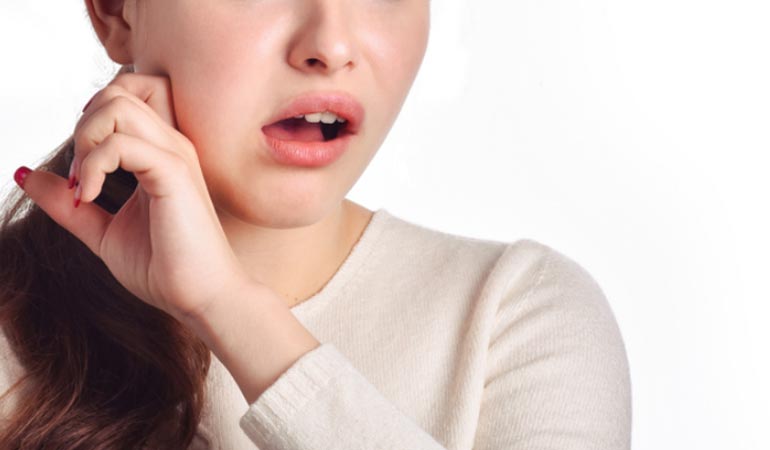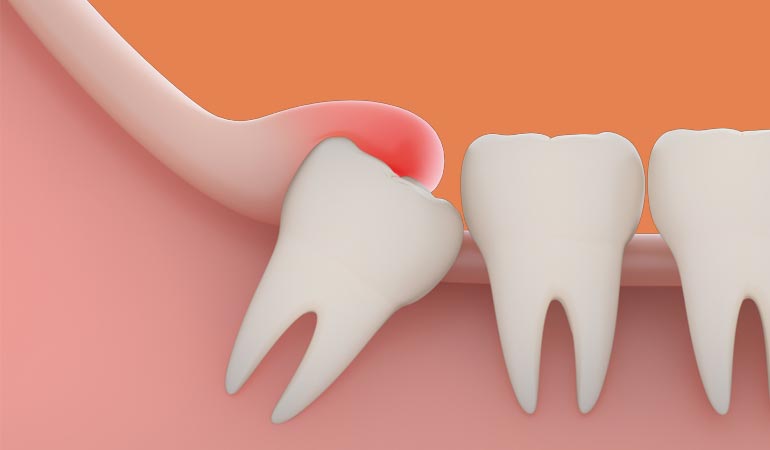Many people ask, “Do wisdom teeth hurt coming in?”. The simple answer is – Yes! They can.
Wisdom teeth are the last pair of teeth to emerge in your mouth, one pair at the back of each jaw. Sometimes, wisdom teeth growing in at awkward angles or even get stuck below the gums and the side of the jaw. This situation causes many complications that require immediate assistance from a dentist.
The next question that you might ask is, “What to do when wisdom teeth hurt?”

This article has answers to all such questions associated with wisdom teeth coming in and the impaction. Read on!
Are Wisdom Teeth Necessary?
Unlike their name, wisdom teeth generally serve no defined purpose in our oral cavity. They only exist as an extra pair of molars at the back of our mouth to aid in grinding.
Wisdom tooth coming in is harmless until there isn’t enough space for them to emerge completely.
A research study reveals that the modern diet lacks a crucial vitamin called K2 that is responsible for the growth and development of the jaw. A lack of this vitamin results in an underdeveloped jaw, which consequently leads to impacted wisdom teeth.
In most cases of impacted wisdom teeth, it becomes necessary to get rid of the impacted tooth to relieve pain and prevent the infection from spreading.
Why Does it hurt when Wisdom teeth come in?
Although there can be several reasons for your wisdom teeth to cause trouble to you, here are three very common of them:
Impacted Wisdom Tooth
Sometimes, there isn’t enough space in your mouth for the wisdom tooth to emerge completely. Consequently, the wisdom tooth erupts at odd angles, thus, seriously impacting the alignment of your jaw. This condition is called impacted wisdom tooth.
Partial Eruption
An impacted wisdom tooth is covered by a small flap of tissue where oftentimes small pieces of food get stuck. This serves as a ground for bacteria to breed, resulting in a bacterial infection. The bacterial infection is one of the most common reasons for wisdom teeth growing in pain.
Tumors or Cysts
Impaction of wisdom teeth can even lead to tumors and cysts. This can later impact healthy teeth and the jawbone. However, this is not very common and can be easily avoided by getting your wisdom teeth treated on time.

5 Signs that Your Wisdom Teeth are Coming in
In order to get timely treatment for impacted wisdom teeth, it becomes crucial to be aware of signs of emerging wisdom teeth:
1. Tenderness and swelling
If you are able to feel soft gums, this could be a sign of wisdom teeth erupting. Sometimes it can be slight discomfort and sensation at the back of your mouth, but it’s necessary that you don’t avoid the sign.
2. Bad breath
An impacted wisdom tooth can make it difficult to clean around itself. This results in bad breath, accompanied by pain and discomfort.
You may start noticing bad breath right after you’ve cleaned your mouth. If that isn’t going away even if you use mouthwash or floss, it’s time to see a doctor.
3. Biting your tongue or Inner Cheek
wisdom teeth growing in can shift the alignment of your teeth without you noticing them. When this happens, you might not be used to the new alignment and misjudge bites on food, thus, accidentally biting your tongue or inner cheek.
If this is happening repeatedly, you might want to have a visit to the dentist.
4. Headaches
When your wisdom teeth coming in get trapped under the tissue, they cause a build-up of pressure inside. This pressure can trigger headaches.
It can be easier to miss noticing this sign when you are already suffering from frequent headaches.
5. Gum infection
Sometimes, wisdom teeth can emerge out in odd positions, leaving the gum tissue vulnerable to infections. Food particles can easily get trapped under this tissue, resulting in a serious bacterial in
fection.

This condition is called ‘Pericoronitis‘ and you don’t want to ignore this but straightaway rush to the dentist.
Preventive measures to Avoid Gum infection
As your wisdom teeth come through, there are effective things you can do to make them less susceptible to a gum infection:
- Take care of oral hygiene: Wisdom teeth are located at the back of your mouth and it can get difficult for your brush to reach there. Using floss, mouthwash, and brushing twice a day is recommended.
- Drink plenty of water: Water helps to flush down any bacteria and food particles stuck inside the gum flap.
- Avoid sweet, sugary foods: Sweet foods can easily get stuck inside the gum flap and again make it easy for bacteria to breed.
How To Stop Wisdom Teeth Coming in From Hurting?
Here we have the answer to “What to do when wisdom teeth hurt?”
While removal is suggested as the best solution to get rid of wisdom tooth problems, some home remedies can relieve pain until your appointment with the doctor.
Home Remedies for Wisdom Tooth pain
There are several home remedies that you can try to soothe wisdom tooth pain.
- Use a cold compress: Putting an ice pack can reduce inflammation and consequently relieve pain. Hold an ice pack against your cheek for about 15 minutes. You can keep on repeating this process until the pain vanishes.
- Rinse with salt and water: Saltwater is a very simple and effective way to treat wisdom tooth pain at home. Rinsing with saltwater provides temporary relief, cleans germs, and heal oral wounds. Just make sure that you don’t swallow any saltwater while rinsing.

- Take an anti-inflammatory medication: Ibuprofen is an effective over-the-counter medicine that helps to relieve inflammation. Other NSAIDs (non-steroidal anti-inflammatory drugs), including Ibuprofen, can be used until you get to see a dentist.
- Numbing gel: A numbing dental gel can also be used to relieve pain. This is available over the counter or online from a pharmacist.
- Bite a clove: Cloves are known for their topical pain-relieving effect. You can either bite a clove right on the affected wisdom tooth for a few minutes or place a cotton ball dipped in clove oil on it.
- Use peppermint tea bags: Peppermint is known for having natural numbing properties. Though mild, these properties can provide temporary relief from the pain. Generally, people like to freeze peppermint tea bags before using them. You can also apply them while they are warm.
Wisdom Tooth Removal
In some cases, home remedies aren’t enough to relieve the pain. In such a case, you can permanently get rid of the wisdom teeth. Impacted wisdom teeth can be removed surgically by a dentist or a dental surgeon.
However, wisdom teeth removal is not always necessary. If you don’t experience any pain, decay, or gum issues, you can keep them.
Do all Wisdom Teeth need Removal?
Wisdom teeth generally erupt at the age of 17-25 years. If their placement is accurate and their alignment is also correct, they do not cause any trouble. Hence, in such a case, they don’t need to be removed.
Other than causing multiple oral health issues, impacted wisdom teeth also make oral hygiene difficult. These teeth can allow bacteria to enter and cause bacterial infection. So, impacted wisdom teeth need immediate attention.
The decision to get your wisdom tooth removed is best left for you and your dentist to make. If your dentist senses any problems that might arise in the future due to your wisdom tooth growing in, he will most probably put wisdom tooth removal as a permanent solution for the problem.
Wisdom teeth can sometimes come along with many troubles that need immediate attention.
While home remedies can be effective in easing the pain, they are only a short-term solution and ultimatel
y you’ll have to see a dentist.
